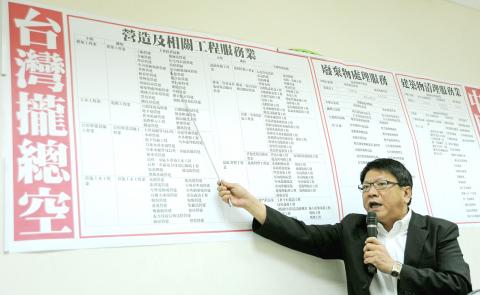Almost half of the respondents to a public opinion poll released yesterday said a trade pact signed by Taiwan and China three years ago has not helped their livelihoods, with a similar proportion saying they do not support the recently signed cross-strait service trade agreement.
The survey was conducted on the eve of the third anniversary of the signing of the Economic Cooperation Framework Agreement (ECFA), which was inked on June 29, 2010, and sought people’s views on the ECFA and the follow-up service trade pact, which was signed on Friday last week in Shanghai.
Asked if the ECFA has improved their financial situation, as the administration of President Ma Ying-jeou (馬英九) has claimed, 48.9 percent of respondents said “no,” while 28.3 percent agreed, and 22.8 percent declined to answer, Taiwan Indicator Survey Research (TISR) said.

Photo: Liu Hsin-de, Taipei Times
With regards to the service trade pact, only 24.9 percent of those polled agreed with the government’s claim that the positive effects would outweigh the negative ones, while 47.4 percent said the downsides would outweigh the positives, and 24.4 percent declined to answer.
Further breakdown of the poll’s results showed that Chinese Nationalist Party (KMT) supporters tended to be more confident about the Ma administration, with 53.9 percent of them believing that benefits from the service trade pact would outweigh the economic damage it could do.
The fear of the impact of an inflow of Chinese investment and workers may have affected the public’s view of the pact as 47.9 percent of respondents said they did not support its signing, 16 percentage points higher than those who said they supported the agreement.
According to TISR, the results are in sharp contrast to a poll conducted in 2010 before the ECFA was signed, when the public support rate for the agreement stood at 47.1 percent, with 33.9 percent against the deal.
The cross-strait service trade agreement should not take effect before being screened by the Legislative Yuan, 64.2 percent of respondents said, while 16.2 percent said the pact should be implemented as soon as possible, and 19.6 percent declined to answer.
The poll, conducted on Tuesday and Wednesday, collected 1,008 valid samples and had a margin of error of 3.1 percentage points.

CHANGING LANDSCAPE: Many of the part-time programs for educators were no longer needed, as many teachers obtain a graduate degree before joining the workforce, experts said Taiwanese universities this year canceled 86 programs, Ministry of Education data showed, with educators attributing the closures to the nation’s low birthrate as well as shifting trends. Fifty-three of the shuttered programs were part-time postgraduate degree programs, about 62 percent of the total, the most in the past five years, the data showed. National Taiwan Normal University (NTNU) discontinued the most part-time master’s programs, at 16: chemistry, life science, earth science, physics, fine arts, music, special education, health promotion and health education, educational psychology and counseling, education, design, Chinese as a second language, library and information sciences, mechatronics engineering, history, physical education

DEADLOCK: As the commission is unable to forum a quorum to review license renewal applications, the channel operators are not at fault and can air past their license date The National Communications Commission (NCC) yesterday said that the Public Television Service (PTS) and 36 other television and radio broadcasters could continue airing, despite the commission’s inability to meet a quorum to review their license renewal applications. The licenses of PTS and the other channels are set to expire between this month and June. The National Communications Commission Organization Act (國家通訊傳播委員會組織法) stipulates that the commission must meet the mandated quorum of four to hold a valid meeting. The seven-member commission currently has only three commissioners. “We have informed the channel operators of the progress we have made in reviewing their license renewal applications, and

The High Prosecutors’ Office yesterday withdrew an appeal against the acquittal of a former bank manager 22 years after his death, marking Taiwan’s first instance of prosecutors rendering posthumous justice to a wrongfully convicted defendant. Chu Ching-en (諸慶恩) — formerly a manager at the Taipei branch of BNP Paribas — was in 1999 accused by Weng Mao-chung (翁茂鍾), then-president of Chia Her Industrial Co, of forging a request for a fixed deposit of US$10 million by I-Hwa Industrial Co, a subsidiary of Chia Her, which was used as collateral. Chu was ruled not guilty in the first trial, but was found guilty

Taiwan People’s Party (TPP) Chairman Huang Kuo-chang (黃國昌) yesterday appealed to the authorities to release former Taipei mayor Ko Wen-je (柯文哲) from pretrial detention amid conflicting reports about his health. The TPP at a news conference on Thursday said that Ko should be released to a hospital for treatment, adding that he has blood in his urine and had spells of pain and nausea followed by vomiting over the past three months. Hsieh Yen-yau (謝炎堯), a retired professor of internal medicine and Ko’s former teacher, said that Ko’s symptoms aligned with gallstones, kidney inflammation and potentially dangerous heart conditions. Ko, charged with